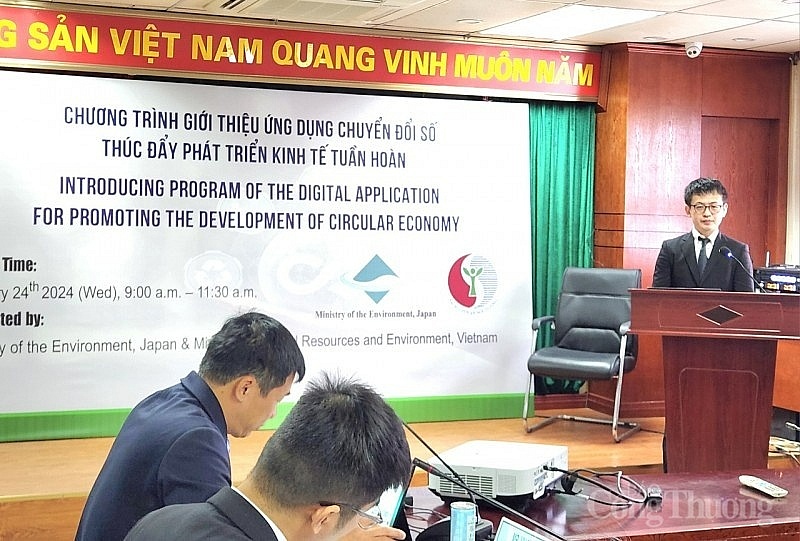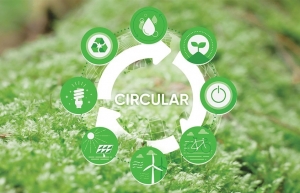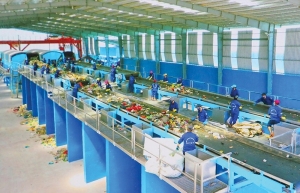Digital transformation to drive circular economy
The event also saw the participation of various ministries, including Natural Resources and Environment, Industry and Trade, Planning and Investment, Science and Technology, and Agriculture and Rural Development.
Representatives from the Ministry of the Environment of Japan, the Japanese Embassy in Vietnam, the Japan International Cooperation Agency (JICA) Vietnam, and the Association of Environmentally Friendly Product Manufacturers of Vietnam, along with several businesses, were also part of the initiative.
Addressing the attendees, Vu Minh Ly, deputy director of RECC, said, “The Vietnamese government has committed to achieving net-zero emissions by 2050. To fulfill this commitment, the country needs to transition its economy from linear to circular through issuing regulations related to sustainable growth models, promote recycling, and adopt resource-efficient practices.”
Ko Matsuura from the Resource Bureau of the Ministry of the Environment of Japan, said, “Japan and Vietnam signed a collaboration agreement in waste management in 2013. Now, in early 2024, the Waste-to-Energy Plant project in Bac Ninh has just been inaugurated, representing an improvement in waste management, environmental protection, and human health.”
"Japan has made significant efforts in resource and environmental management and promoting a circular economy. I believe that with our experience, technology, and expertise, we can help Vietnam improve waste management," Matsuura added
In October last year, JICA Vietnam initiated a technical support project to establish regulations for an intelligent eco-industrial park using IT in its management and operation in Ba Ria-Vung Tau province. This system can be utilised in JICA's project to promote the implementation of Decree No.35/2022/ND-CP on the management of industrial parks and economic zones.
 |
| Ambassador Akira Hiroi addressing participants |
Speaking at the programme, Akira Hiroi, Japanese Ambassador to Vietnam, said, “Waste management is currently the most critical issue internationally. Vietnam's waste volume is increasing, and current waste management and disposal models are inadequate. However, Vietnam is making efforts to shift from a linear production model that uses many resources to a circular economy that promotes sustainable resource use.”
With urbanisation, population growth, and shifting consumption patterns, Vietnam is grappling with an increasing influx of waste that putting strain on its existing disposal infrastructure. The inadequacy of current waste management systems covering collection, transportation, and disposal further compounds the environmental challenges.
In collaboration with international partners, particularly Japan, Vietnam is seeking to leverage external expertise and best practices in waste management and circular economy development. Projects and agreements with countries renowned for their advanced waste management systems demonstrate a commitment to addressing challenges and implementing sustainable solutions.
"The Japanese government hopes to contribute to Vietnam's circular economy transition through its ongoing collaborative programmes and through many future initiatives," Hiroi added.
Attendees of the event discussed the challenges inherent in introducing and implementing a smart material circulation system in industrial areas in Vietnam.
 | Implementation of the circular economy in Vietnam The circular economy concept was developed as a forward-looking solution for society in the face of escalating environmental pollution and resource depletion. Le Khanh Lam, chairman of RSM Vietnam, offers an overview of how the country is implementing a number of innovative manufacturing and business models that are geared towards a circular economy. |
 | Circular economy model vital to business development Many businesses globally have pioneered the transformation from a linear to a circular economy, accepting the many challenges to build a green economy and foster sustainable development. |
 | Long-term action plans to service a circular economy Vietnam’s pursuit of a circular economy is offering numerous opportunities for businesses. However, in order for this new model to flourish, the government needs to create momentum. |
What the stars mean:
★ Poor ★ ★ Promising ★★★ Good ★★★★ Very good ★★★★★ Exceptional
Related Contents
Latest News
More News
- Trung Nam-Sideros River consortium wins bid for LNG venture (January 30, 2026 | 11:16)
- Vietnam moves towards market-based fuel management with E10 rollout (January 30, 2026 | 11:10)
- Envision Energy, REE Group partner on 128MW wind projects (January 30, 2026 | 10:58)
- Vingroup consults on carbon credits for electric vehicle charging network (January 28, 2026 | 11:04)
- Bac Ai Pumped Storage Hydropower Plant to enter peak construction phase (January 27, 2026 | 08:00)
- ASEAN could scale up sustainable aviation fuel by 2050 (January 24, 2026 | 10:19)
- 64,000 hectares of sea allocated for offshore wind surveys (January 22, 2026 | 20:23)
- EVN secures financing for Quang Trach II LNG power plant (January 17, 2026 | 15:55)
- PC1 teams up with DENZAI on regional wind projects (January 16, 2026 | 21:18)
- Innovation and ESG practices drive green transition in the digital era (January 16, 2026 | 16:51)

 Tag:
Tag:

















 Mobile Version
Mobile Version